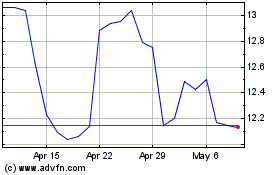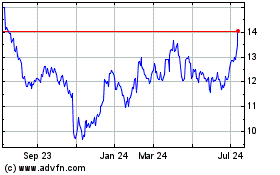Auto Makers Meet with Donald Trump on Emissions, Nafta
May 11 2018 - 2:54PM
Dow Jones News
By Rebecca Ballhaus and Mike Spector
WASHINGTON -- President Donald Trump on Friday met with
executives of the big auto makers, who are seeking to prevent a
clash between the administration and the state of California over
fuel-economy requirements.
"We are going to be talking about environmental control,
[Corporate Average Fuel Economy] standards and manufacturing
millions of new cars within the United States," Mr. Trump said
Friday, as he welcomed the chief executives of companies that
included General Motors Co., Ford Motor Co. and Daimler AG's
Mercedes-Benz USA at the White House.
Mr. Trump singled out Sergio Marchionne, the chairman and CEO of
Fiat Chrysler Automobiles NV, for praise and lauded the company's
plans to move a facility to Michigan from Mexico.
"That's what we like," Mr. Trump said. "Right now, he's my
favorite man in the room."
Mr. Trump said he planned to discuss "how to build more cars in
the United States" and urged the auto makers to "build them here
and ship them overseas." He also credited the law overhauling the
U.S. tax code that he signed last year for increasing auto
manufacturing in the U.S.
The administration has sought to cut back dramatically on
Obama-era emissions regulations, which are supported by California
and other states. The president and his senior advisers have
indicated they are ready to confront local resistance to the rules
rollback, but have shown frustration over what they describe as
tepid support from car makers for the regulatory initiative.
Auto makers, meanwhile, say the current standards for their cars
and trucks are too rigorous and don't reflect consumer demand. But
they have voiced concern that the rollback being pushed by the
White House is so extensive that it will cause more problems than
it seeks to solve.
The executives and the president were expected to discuss
California, which has its own powers over fuel-efficiency standards
and is suing to stop the administration's overhaul. That has
escalated a power struggle between Washington and Sacramento that
some fear could result in auto makers having to meet two different
standards for selling cars and trucks in the U.S.
California has an EPA waiver allowing it to set its own
standards for tailpipe emissions that many other states follow, a
coalition that makes up a sizable portion of the U.S. car market.
Auto makers, thus, both want relaxed federal standards and changes
that California will accept, lest they face conflicting regulations
across state lines that could increase compliance costs and wreak
havoc on plans for vehicle designs drawn up years in advance.
Auto makers also are expected to seek clarity from the White
House on its efforts to rewrite auto rules at the center of
negotiations over the North American Free Trade Agreement.
Mr. Trump during a portion of the meeting to which reporters
were invited again assailed Nafta, and the subsequent discussions
with car executives were expected to provide an opportunity for
vehicle manufacturers to sound out the president on proposed
changes to the agreement's auto rules.
A Republican congressional aide said this week that negotiators
could strike a "skinny deal" on Nafta that would include a thorough
rewrite of the complicated rules that govern which cars and auto
parts can be traded within the bloc without incurring duties.
Auto makers have showed signs of relief as the trade
negotiations come to a head, with the Trump administration dropping
aggressive proposals they opposed.
The U.S. now wants vehicles and significant components that move
across the Nafta region to have at least 75% North American content
to avoid duties when crossing borders, down from a previous
proposal of 85%. The current trade pact sets the so-called
rules-of-origin threshold at 62.5%. The Trump administration also
has dropped a previous suggestion that vehicles be made up of 50%
U.S. content to pass through borders duty free.
Detroit's three auto makers "appreciate the constructive
dialogue that has occurred between U.S. industry and the
administration to update the automotive rules of origin," said Matt
Blunt, president of the American Automotive Policy Council, a
Washington association representing GM, Ford and Fiat Chrysler, at
the end of April.
Mr. Blunt added at the time that the companies were "encouraged
by the direction the discussions have taken in recent weeks" and
urged the U.S., Canada and Mexico to "quickly complete the
negotiations."
Detroit's auto makers and other vehicle manufacturers have moved
significant amounts of production to Mexico, and had grown
concerned that drastic changes to Nafta would upset their business
plans and potentially force higher prices on consumers.
"As the negotiations get closer to the finish line, it is
important that the agreement create feasible automotive rules that
treat all U.S. auto producers equally," said John Bozzella, head of
a coalition of international auto makers, earlier this month. Mr.
Bozzella was among the attendees expected at Friday's White House
gathering.
Mr. Trump has rattled car executives dating back to his
presidential campaign, questioning their commitments to U.S. jobs
and threatening stiff border taxes on Mexican imports. Auto makers
have responded by highlighting U.S. commitments and, in some cases,
changed foreign investment plans. Mr. Trump has touted industry
announcements, even some that were long-planned and not necessarily
responses to his criticisms.
According to Mr. Bozzella's group, international auto makers
built more than 5.1 million cars and trucks in the U.S. in 2017,
just under half of all light-duty vehicle production
nationwide.
Write to Rebecca Ballhaus at Rebecca.Ballhaus@wsj.com and Mike
Spector at mike.spector@wsj.com
(END) Dow Jones Newswires
May 11, 2018 14:39 ET (18:39 GMT)
Copyright (c) 2018 Dow Jones & Company, Inc.
Ford Motor (NYSE:F)
Historical Stock Chart
From Aug 2024 to Sep 2024

Ford Motor (NYSE:F)
Historical Stock Chart
From Sep 2023 to Sep 2024
